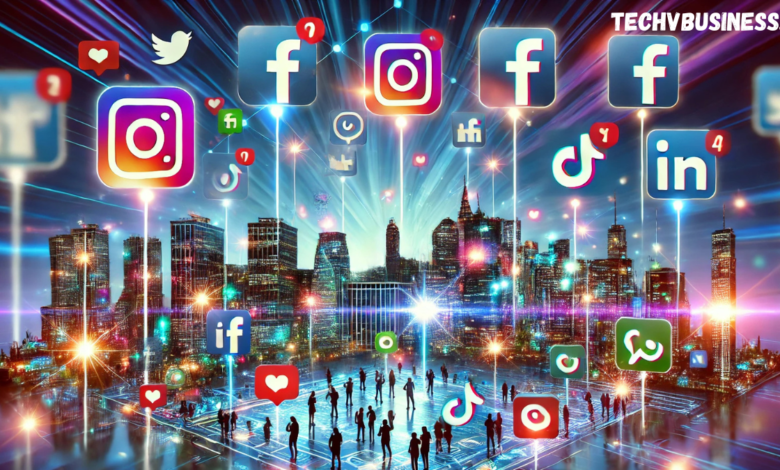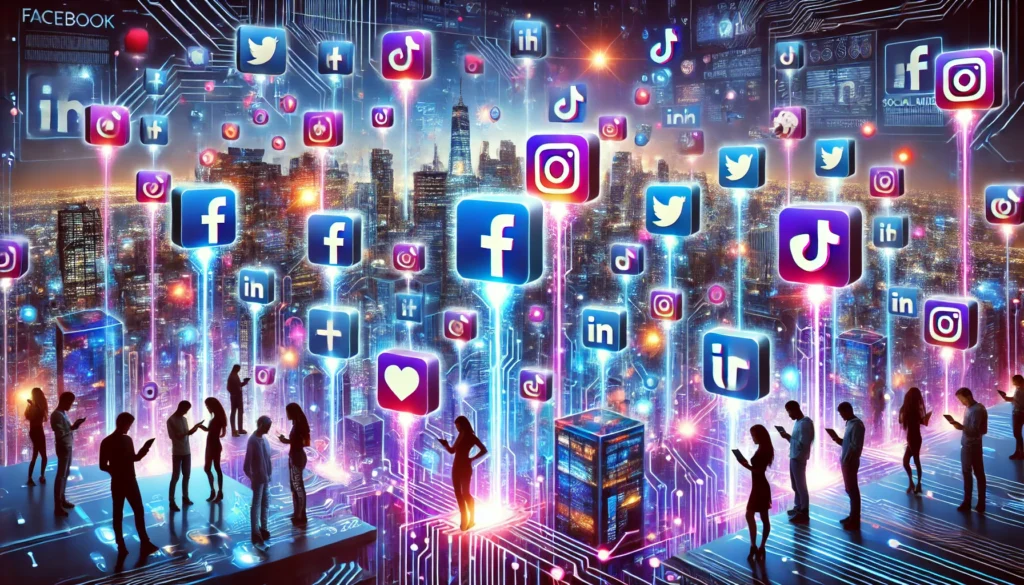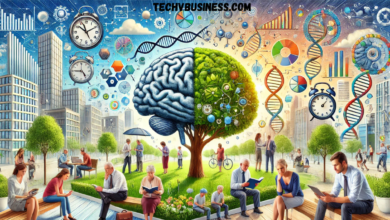Navigating the Waves of Social Media A Comprehensive Guide

Introduction
Social media has transformed the way we communicate, share information, and conduct business. What started as a means to stay connected with friends and family has evolved into a powerful tool that influences various aspects of life, from Social Media and education to politics and mental health. The rise of platforms like Facebook, Instagram, Twitter, LinkedIn, and TikTok has significantly shaped human interactions, making digital engagement an integral part of our daily routines.
With billions of users worldwide, social media has become more than just a digital space; it is a global community that fosters discussions, spreads awareness, and creates opportunities. However, as much as it offers benefits, it also comes with challenges such as misinformation, cyberbullying, and privacy concerns.
This article provides an in-depth analysis of the evolution of social media, its benefits, challenges, strategies for success, and what the future holds. Whether you are an individual user, business owner, or digital strategist, understanding social media’s impact and how to leverage it effectively is crucial in today’s fast-paced digital landscape.
The Evolution of Social Media
Social media has come a long way from its early days, evolving into a dynamic space that caters to different interests and purposes. The first social networking sites, such as MySpace and Friendster, laid the foundation for what would become a booming industry. With the launch of Facebook in 2004, social media took a significant leap, introducing features that allowed users to connect, share content, and engage with brands on a more interactive level.
Over the years, social media platforms have diversified to cater to specific needs. Twitter revolutionized real-time communication with its short-form messaging system, while Instagram and Snapchat changed the way users consume visual content. More recently, TikTok has gained popularity for its engaging short-form videos, attracting younger audiences and reshaping digital marketing strategies.
The evolution of social media has also seen major shifts in user behavior. Initially used for personal connections, social media is now a powerful tool for business marketing, education, and activism. Companies leverage these platforms for branding, customer engagement, and sales, while activists and organizations use them to mobilize support for social and political causes. As technology advances, social media continues to redefine itself, integrating artificial intelligence (AI), virtual reality (VR), and augmented reality (AR) to create more immersive experiences.
Benefits of Social Media
One of the biggest advantages of social media is its ability to connect people across the globe. It breaks down geographical barriers, allowing users to interact with friends, family, and colleagues regardless of distance. Online communities enable individuals with shared interests to engage in discussions, support each other, and build meaningful relationships.
For businesses, social media serves as a powerful marketing tool. Platforms like Facebook, Instagram, and LinkedIn provide businesses with opportunities to promote their products, engage with customers, and build brand loyalty. Social media advertising allows businesses to reach targeted audiences, track engagement metrics, and optimize their strategies based on real-time data. Influencer marketing has also gained momentum, with brands collaborating with influencers to expand their reach and drive sales.
Beyond business, social media plays a crucial role in education and awareness. It provides a platform for knowledge-sharing, enabling educators, students, and professionals to exchange ideas and access learning resources. Educational institutions leverage social media to conduct online courses, host webinars, and engage with students. Similarly, social media is instrumental in raising awareness about global issues, supporting charitable causes, and mobilizing communities for social change.
Challenges and Pitfalls of Social Media
Despite its numerous benefits, social media has its fair share of challenges. One major concern is privacy and data security. Social media platforms collect vast amounts of user data, raising concerns about data breaches and misuse of personal information. Users must be cautious about the information they share online and ensure they adjust their privacy settings to protect their data.
Another challenge is the spread of misinformation and fake news. Social media enables rapid information dissemination, but this also means that false or misleading content can spread quickly. Misinformation can influence public opinion, contribute to social unrest, and create confusion during crises. Platforms like Facebook and Twitter have implemented fact-checking measures, but users must remain vigilant and verify information from credible sources before sharing it.
Mental health issues linked to social media use are another growing concern. Studies have shown that excessive social media usage can lead to anxiety, depression, and low self-esteem. The pressure to maintain a curated online presence, the fear of missing out (FOMO), and exposure to negative content can affect users’ mental well-being. It is crucial to practice mindful social media usage and set healthy boundaries to minimize these effects.
Social Media Strategies for Success

To make the most of social media, individuals and businesses must adopt effective strategies. For personal users, maintaining a balance between online and offline interactions is essential. Setting time limits, curating the content consumed, and engaging in meaningful discussions can help enhance the overall social media experience.
Businesses must prioritize creating engaging and high-quality content. Visual content such as videos, infographics, and live streams tend to perform well and drive higher engagement. Consistency is key—posting regularly and interacting with followers helps build a strong online presence. Utilizing analytics tools to track performance and adjust strategies based on data insights can improve engagement and conversion rates.
For educators and organizations, leveraging social media for knowledge-sharing and networking can be beneficial. Hosting live Q&A sessions, participating in industry discussions, and sharing valuable resources can enhance credibility and attract a wider audience. Responsible use of social media, coupled with ethical considerations, ensures a positive and impactful digital presence.
The Future of Social Media
Social media is constantly evolving, and emerging technologies are shaping its future. Artificial intelligence (AI) is playing a significant role in enhancing user experiences, from personalized content recommendations to automated chatbots that improve customer service. Virtual reality (VR) and augmented reality (AR) are also transforming social media by creating immersive environments for users to interact and engage.
Regulatory measures are expected to become more stringent as concerns about data privacy and misinformation continue to grow. Governments and organizations are implementing stricter policies to protect users and hold platforms accountable for the content shared. Social media ethics and digital literacy will become increasingly important in navigating the online landscape responsibly.
As social media continues to evolve, users must adapt to changes, embrace innovation, and use these platforms for meaningful interactions. Whether for personal, business, or educational purposes, leveraging social media effectively can enhance connectivity, promote learning, and drive positive change.
Conclusion
Social media has revolutionized communication, marketing, and social interactions. While it offers numerous benefits, including global connectivity, business opportunities, and knowledge-sharing, it also presents challenges such as privacy concerns, misinformation, and mental health effects. Understanding how to navigate social media responsibly and strategically can help individuals and businesses maximize its advantages while mitigating risks.
You May Also Read: https://techvbusiness.com/cute-fall-nails/



